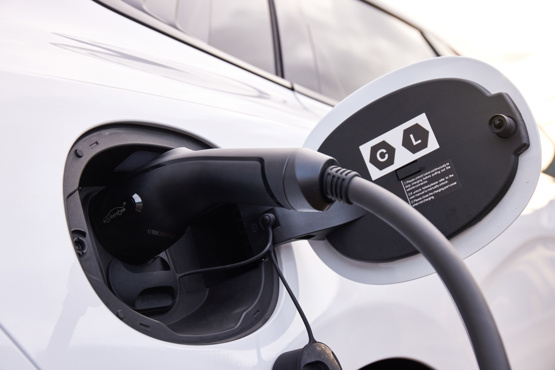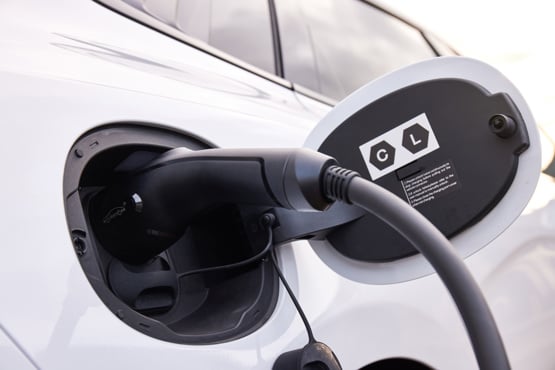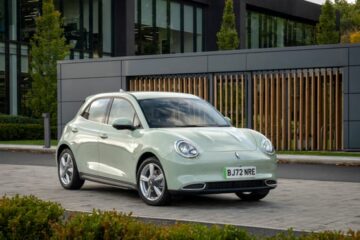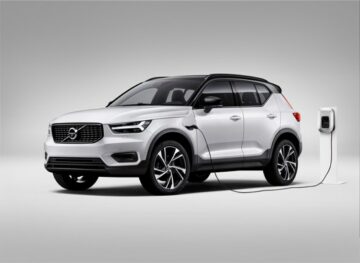The Society of Motor Manufacturers and Traders (SMMT) has said a sluggish private new car market and shrinking electric vehicle (EV) demand signal the challenge for 2024, despite 10.4% growth overall in the plate-change month of March.
Private demand for new car sales fell by 7.7% during the March plate-change, while fleets drove overall growth across the market to 10.4%.
The latest figures from the Society of Motor Manufacturers and Traders (SMMT) showed the new 317,786 new cars reached the road with a 24-plate, which is the best March performance since 2019, although still 30.6% below pre-pandemic levels.
Fleets saw a 29.6%% increase in registrations in March, which was what was responsible for driving growth forward.
Sue Robinson, chief executive of the National Franchised Dealers Association (NFDA), said that while Q1’s new car market performance has been encouraging, it’s still disappointing the sector has not received support from the UK government in the form of price incentives for EVs, particularly as manufacturers seek to meet the targets outlined by the zero emissions vehicle (ZEV) mandate.
Battery electric vehicles (BEVs) experienced an increase, up 3.8% to 48,388 units in March.
Plug-in hybrid (PHEVs) registrations increased by 7.7% to 24,517 units, and hybrids (HEVs) followed with growth of 19.6% to 44,550 units.
There are 84,314 registered BEVs on the road in 2024 compared to the 76,233 units at the same point last year, a 10.6% increase.
BEV market share at 15.5% YTD

BEVs saw a 15.6% market share in March, as well as a 15.5% market share for the year-to-date, which will continue to press home calls that retail demand for electric vehicles continues to stagnate.
The ZEV mandate sets out the percentage of new zero emission cars and vans manufacturers will be required to produce each year up to 2030.
The market is aiming for 22% market share for BEVs this year, but is struggling to push into the mass market and beyond 16%, even with retailers across the UK incentivised to increase EVs as part of their new car sales mix by some of their original equipment manufacturer (OEM) partners.
Robinson said: “Private demand continues to be superseded by fleet, as has been the case in recent months, in which incentives could act to encourage private buyers.
“NFDA will continue to press the Government on current issues affecting the industry to ensure the best outcomes for dealers and consumers.”
Mike Hawes, SMMT chief executive, reiterated that Government needs to step in to private support for private consumers to help boost the retail demand for EVs.
He said: “Market growth continues, fuelled by fleets investing after two tough years of constrained supply.
“A sluggish private market and shrinking EV market share, however, show the challenge ahead.
“Manufacturers are providing compelling offers, but they can’t single-handedly fund the transition indefinitely.
“Government support for private consumers – not just business and fleets – would send a positive message and deliver a faster, fairer transition on time and on target.”
The SMMT is calling for a temporary halving of VAT on BEVs, a revision to the threshold for the expensive car supplement on VED next April, and abolishing the ‘pavement penalty’ on public EV charging by equalising VAT rates to 5% in line with home charging.

EV affordability needs to be addressed
Ian Plummer, commercial director at Auto Trader, said sales of electric vehicles are still rising, despite the gloom from Tesla earlier in the week, that it had its biggest sales slump in Q1 since 2022.
Plummer said: “While the fleet side of the market is driving the growth, more needs to be done to stimulate electric vehicle demand among private buyers where affordability remains the number 1 barrier.
“That said, manufacturers are fighting harder than ever to tempt customers, as more than three-quarters of new EVs are now advertised on our website with discounts, with the average discount applied increasing to 11% last month.
“That trend only looks set to accelerate as manufacturers struggle to meet strict ZEV mandate targets in a much more competitive landscape.”
Plummer said the arrival of new Chinese entrants is likely to continue to shake up the market and bring down prices for consumers.
He added: “Their share of new car advert views on our platform has more than tripled since March 2021.
“Underlying demand from consumers also remains strong after a record 89.1m visits to our website last month.”
Lisa Watson, director of sales at Close Brothers Motor Finance, said the ZEV mandate is ‘causing headaches’ for OEMs as buyers remain reluctant to make the shift to EV. The company’s own research shows that only 12% of customers are planning on buying an EV this year.
Watson said: “The delay of the 2030 ban on new petrol and diesel vehicles should help to reduce motorists’ concerns.
“Our recent research found that 30% of drivers feel that the delay will allow for more time to improve infrastructure. For the time being, it’s important that dealers maximise the tools and insights at their disposal to keep on top of consumer demand in order to stock forecourts appropriately.”
Jamie Hamilton, automotive partner and head of electric vehicles at Deloitte, said the battle to increase EV registrations is still driven by consumer concern around price and access to charging infrastructure.
Deloitte’s recent Global Automotive Consumer study shows that affordability concerns are also among the top reasons to change vehicle as consumers continue to feel cost pressures.
Hamilton said: “Initial sticker price, combined with continued uncertainties over residual prices and high interest rates, are resulting in higher monthly payments that are causing customers to hesitate about switching to a BEV.
“Additionally, concerns about being able to regularly access available public charging infrastructure continues to act as a drag to adoption, particularly for those customers without off-street parking.
“Plug-in hybrid electric vehicles (PHEV) are increasingly a more popular alternative for consumers in the meantime, with PHEV registrations growing 36.7% in March.”
Lex Autolease, one of the biggest leasing companies in the UK, is still expecting to see “significant market growth” in EVs this year.
A pivotal year for EV adoption
Nick Williams, Lex Autolease managing director, said: “While market share fell in March, I still believe this will be a pivotal year for electric vehicle adoption.
“With the 2024 ZEV target and tough competition from Chinese rivals bearing down on carmakers, many are reimagining their operations and creating partnerships to cut manufacturing costs and launch more affordable models.”
Williams said Lex is seeing appetite among private drivers grow for EVs, with its latest Future of Transport report finding that two thirds of 17 to 35-year-olds are planning to make their next car electric, and that far fewer see costs as a barrier compared to their parents’ generation.
He added: “While there’s still strong demand from both industry and drivers for more action from Government to speed up adoption, we expect to see significant market growth this year.”
James Hosking, AA Cars managing director, has a more positive outlook for 2024, noting that as inflation is cooling, many car customers are seeing their earnings rise faster than the cost of living and this will lend some increased confidence to personal finances.
Hosking said: “This confidence is having a decisive impact on demand, but dealers and manufacturers too have played a key role in the market’s strong start to 2024.
“Central to this is the steady rise in EV sales. One in every six new cars sold so far this year was an EV, and the choice available is expanding rapidly, with many marques introducing more budget-friendly, entry-level models to tempt first-time EV owners.
“It is important that the roll-out of chargers continues apace to reassure wavering would-be buyers that there will always be somewhere to top up their battery when they’re out on the road or on a longer journey.”
David Borland, EY UK & Ireland Automotive Leader, acknowledged that OEMs are ramping up incentives for EVs, but questioned how long this will be sustainable this will be for the long term.
Borland said there are clear signs of a return towards a ‘supply push’ model.
He added: “The absence of EV-related subsidies for private retail consumers, as well as ongoing high retail prices and reduced affordability of finance given higher APRs, continues to drag on the BEV segment of the market.”
- SEO Powered Content & PR Distribution. Get Amplified Today.
- PlatoData.Network Vertical Generative Ai. Empower Yourself. Access Here.
- PlatoAiStream. Web3 Intelligence. Knowledge Amplified. Access Here.
- PlatoESG. Carbon, CleanTech, Energy, Environment, Solar, Waste Management. Access Here.
- PlatoHealth. Biotech and Clinical Trials Intelligence. Access Here.
- Source: https://www.am-online.com/news/market-insight/2024/04/04/fleets-drive-march-plate-change-growth-of-104
- :has
- :is
- :not
- :where
- $UP
- 1
- 10
- 15%
- 17
- 19
- 1M
- 2019
- 2021
- 2022
- 2024
- 2030
- 24
- 29
- 30
- 36
- 48
- 7
- 84
- 89
- a
- Able
- About
- absence
- accelerate
- access
- acknowledged
- across
- Act
- Action
- added
- Additionally
- Adoption
- affecting
- affordable
- After
- ahead
- Aiming
- allow
- also
- alternative
- Although
- always
- among
- an
- and
- appetite
- applied
- appropriately
- April
- ARE
- around
- arrival
- AS
- Association
- At
- auto
- automotive
- available
- average
- Ban
- barrier
- battery
- Battle
- BE
- been
- being
- believe
- below
- BEST
- Beyond
- Biggest
- boost
- both
- bring
- brothers
- business
- but
- buyers
- Buying
- by
- byd
- calling
- Calls
- car
- cars
- case
- causing
- challenge
- challenges
- change
- charging
- chief
- Chief Executive
- chinese
- choice
- clear
- clear signs
- Close
- combined
- commercial
- Companies
- company
- compared
- compelling
- competition
- competitive
- Concerns
- confidence
- constrained
- consumer
- Consumers
- continue
- continued
- continues
- Cost
- Costs
- could
- Creating
- Current
- Customers
- Cut
- dealers
- decisive
- delay
- deliver
- deloitte
- Demand
- Despite
- diesel
- Director
- disappointing
- Discount
- discounts
- disposal
- done
- down
- driven
- drivers
- driving
- during
- each
- Earlier
- Earnings
- Electric
- electric vehicle
- electric vehicles
- emission
- Emissions
- encourage
- encouraging
- ensure
- entrants
- entry-level
- equipment
- Ether (ETH)
- EV
- Even
- EVER
- Every
- evs
- executive
- expanding
- expect
- expecting
- expensive
- experienced
- EY
- fairer
- far
- faster
- feel
- fewer
- fighting
- Figures
- finance
- Finances
- FLEET
- followed
- For
- For Consumers
- form
- Forward
- found
- from
- fund
- future
- generation
- given
- Global
- Government
- government support
- Grow
- Growing
- Growth
- had
- Halving
- Hamilton
- harder
- Have
- having
- head
- headaches
- help
- High
- higher
- Home
- How
- However
- HTTPS
- Hybrid
- i
- Impact
- important
- improve
- in
- Incentives
- Increase
- increased
- increasing
- increasingly
- indefinitely
- industry
- inflation
- Infrastructure
- initial
- insights
- interest
- Interest Rates
- into
- introducing
- investing
- ireland
- issues
- IT
- ITS
- journey
- jpg
- just
- Keep
- Key
- landscape
- Last
- Last Year
- latest
- launch
- leader
- leasing
- LEND
- levels
- likely
- Line
- living
- Long
- longer
- LOOKS
- make
- managing
- Managing Director
- mandate
- Manufacturer
- Manufacturers
- manufacturing
- many
- March
- Market
- market performance
- market share
- Mass
- maximise
- meantime
- Meet
- message
- mix
- model
- models
- Month
- monthly
- months
- more
- Motor
- much
- National
- needs
- New
- next
- noting
- now
- number
- number 1
- of
- Offers
- on
- ONE
- ongoing
- only
- Operations
- or
- order
- original
- our
- out
- outcomes
- outlined
- Outlook
- over
- overall
- own
- owners
- parking
- part
- particularly
- partner
- partners
- partnerships
- payments
- percentage
- performance
- personal
- pivotal
- planning
- platform
- plato
- Plato Data Intelligence
- PlatoData
- played
- Point
- Popular
- positive
- press
- pressures
- price
- Prices
- private
- produce
- providing
- public
- Push
- Q1
- Questioned
- ramping
- rapidly
- Rates
- RE
- reached
- reasons
- reassure
- received
- recent
- record
- reduce
- Reduced
- registered
- registrations
- regularly
- reimagining
- remain
- remains
- report
- required
- research
- responsible
- resulting
- retail
- retailers
- return
- Rise
- rising
- rivals
- road
- Role
- s
- Said
- sales
- same
- saw
- sector
- see
- seeing
- Seek
- segment
- send
- set
- Sets
- Share
- shift
- should
- show
- showed
- Shows
- side
- Signal
- significant
- Signs
- since
- SIX
- sluggish
- Slump
- So
- so Far
- Society
- sold
- some
- somewhere
- speed
- start
- steady
- Step
- sticker
- Still
- stimulate
- stock
- strict
- strong
- Struggle
- Struggling
- supplement
- supply
- support
- sustainable
- Target
- targets
- term
- Tesla
- than
- that
- The
- the UK
- their
- There.
- they
- this
- this year
- those
- threshold
- time
- to
- too
- tools
- top
- tough
- towards
- trader
- Traders
- transition
- transport
- Trend
- two
- Uk
- UK government
- uncertainties
- underlying
- units
- VAT
- vehicle
- Vehicles
- views
- Visits
- was
- Watson
- we
- Website
- week
- WELL
- What
- when
- which
- while
- will
- Williams
- with
- without
- would
- year
- years
- zephyrnet
- zero













